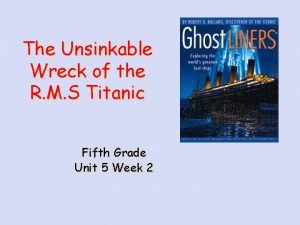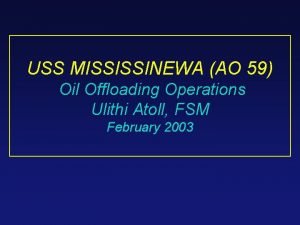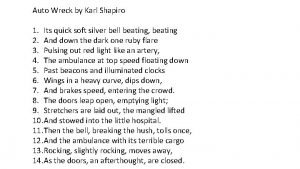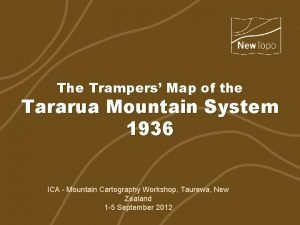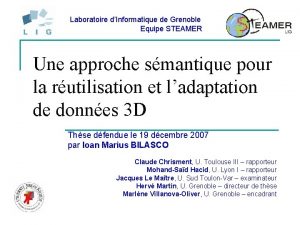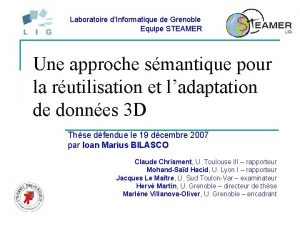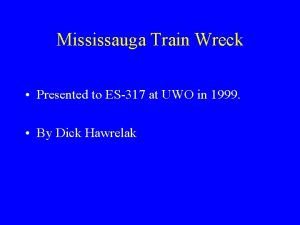The Wreck of the Steamer Tararua Special thanks















- Slides: 15

The Wreck of the Steamer Tararua Special thanks is extended to Mr. Steven Mc. Lachlan, Shades Arcade Stamp Centre, Christchurch, for use of this image.

Two curious graves in Dunedin’s Northern Cemetery Recorded on this granite obelisk is the following… Alexander Livingstone drowned in the S. S. Taraua 29 April 1881. Both these headstones mention the same event. What happened? Recorded on this damaged granite headstone is the following… In loving memory of John Oliver Eva Dunedin Who was lost in the steamship Tararua At Otara Reef NZ 29 th April 1881 Aged 39 years

Location of graves in Dunedin’s Northern Cemetery 2 Alexander Livingston Block 2 Plot 16 Alexander Livingston was a member of the crew on the S. S. Tararua and John Eva was a passenger. 1 1 2 John Eva Block 101 Plot 3.

Another grave at Barbadoes Street Cemetery in Christchurch Recorded on this large marble headstone is the following… Francis George Garrard Master of the S. S. Tararua Who perished at the wreck of his vessel on the Otara reef 30 th April 1881 Aged 29 years. The headstone can be seen just inside the lych gate of the Cemetery.

What happened 1 ? The S. S. Tararua sailed from Port Chalmers at 5 pm on April 28, 1881 bound for Melbourne via Bluff. The night was dark but clear and at 4 am the vessel was off the southern most point of the South Island. At 5 am the vessel struck the Otara reef at Waipapa point about ¾ of a mile from shore. The ship quickly filled with water. At 5. 40 am a boat with the second mate in charge was lowered to find a landing place and about halfway to the shore a Mr. G Lawrence dived overboard and swam to call for help at a house ½ a mile away. Charles Gibb rode 35 miles by horseback to the nearest telegraph office at Wyndham to raise the alarm. By noon the ship was being washed by heavy seas. Six strong swimmers attempted to swim to shore. Three were drowned. Two boats were washed out of their davits. An attempt was made to land on the reef but again several strong swimmers were washed off and three more strong swimmers were drowned.

Where did this happen? Map of New Zealand showing the location of the Port Chalmers, Otara Reef, Waipapa Point and Fortrose. South Island North Island Christchurch Dunedin Port Chalmers Invercargill Fortrose Waipapa Point The distance travelled by the S. S. Tararua Otara Reef

What happened 2? The second mate tried to return the boat to the Tararua but the seas were now too strong and he stood out to sea to intercept any passing vessels for help. A boat in charge of the chief officer tried to get a line to shore but the boat capsized. Eight people reached shore safely. A young lad was drowned. By 2 pm the Tararua began to break up. Heavy seas washing overboard swept about 20 people to their deaths. Only the chief cook reached the shore. By evening the survivors had only the rigging to cling to and by 2. 30 am the last screams were heard from the Tararua. By the time help arrived by daylight on the 30 th with the arrival of the S. S. Hawea only the bowsprit and the mizzen mast could be seen above water. Of 151 persons on board, 131 lost their lives. Only 20 men were saved 12 members of the crew and 8 steerage passengers. 105 men, 12 women and 14 children lost their lives in New Zealand’s second worst shipping disaster.

An old postcard showing an artists impression of the SS Tararua on the reef (right) and with passengers swimming to shore (left) Special thanks is extended to Mr. Steven Mc. Lachlan, Shades Arcade Stamp Centre, Christchurch, for use of this image.

Otara Reef – Waipapa Point The line of rocks known as Otara reef can be clearly seen in this photo taken from the Waipapa Point lighthouse. The reef extends out to sea for seven miles.

Part Poem – The Wreck of the Tararua Otago Witness 7 May 1881 Looking towards Waipapa Point from about where the Taraua was wrecked

The Tararua Acre Cemetery Several of those drowned were identified and claimed by relatives but many victims could not be identified. Ground for a cemetery was allocated behind the sand hills beyond the beach where the Tararua came a ground. Below: Approach across the paddocks. Above: View of the cemetery from the sand hills today.

The Tararua Acre Cemetery 2 Only one individual headstone remains. The headstone belongs to William Bell… In Loving remembrance of William Bell of Auckland Lost on the S. S. Tararua 29 th April 1891 In his 29 th year Above: This cairn was set over the largest plot in 1967. The cairn was funded by the Department of Internal Affairs.

The Tararua Acre Cemetery 3 The children of Fortrose and surrounding district schools raised money for a marble headstone to commemorate the victims who were unmarked except for wooden picket fence grave surrounds. The memorial inscriptions reads… Erected by the children of Fortrose School Assisted by other district schools In memory of those who perished by the wreck of the S. S. Tararua 29 th April 1881 The collections for the headstones must have gone on for many years. Many older folk even in the 1970 s remembered taking their threepenny contributions to the school. (Joan Mac. Intosh*).

The Fortrose Cemetery The Fortrose cemetery also contains a memorial placed over the site of a smaller number of victims, that was paid for by the children of the school and surrounding districts. For many years the children assembled on the anniversary of the wreck and laid flowers on the graves of the victims. The older boys kept the small plot in the cemetery neat and tidy. One visitor was so impressed by the boys’ care that he sent them a round football. When the football became shabby Mr Miilard, the headmaster, suggested it was time to work at the cemetery. As long as Mr Millard worked at the school, a new football arrived every year for the boys. This inscription is the same as the children’s memorial at the Tararua Acre Cemetery.

The Waipapa Point Lighthouse The Memorial for the Tararua victims is not the only shipwreck recorded at Fortrose. On a neighbouring grave there is a headstone for David Lindsay who was drowned when the William Ackers was wrecked on Waipapa Point in 1876. As a result of the Tararua disaster this lighthouse was erected in 1885.
 Koch arnold steamer
Koch arnold steamer Shortest path with negative weights
Shortest path with negative weights Acknowledgement special thanks to
Acknowledgement special thanks to The wreck of the zanzibar comprehension questions
The wreck of the zanzibar comprehension questions The unsinkable wreck of the rms titanic
The unsinkable wreck of the rms titanic Uss mississinewa wreck
Uss mississinewa wreck Ramblin wreck from georgia tech lyrics
Ramblin wreck from georgia tech lyrics Kms bismarck wreck
Kms bismarck wreck Check yourself before you wreck yourself origin
Check yourself before you wreck yourself origin Auto wreck poem
Auto wreck poem Niss wreck
Niss wreck Titanic
Titanic Strain transformation
Strain transformation Thanks for the reminder.
Thanks for the reminder. Thanks for your attencion
Thanks for your attencion Thanks for listening
Thanks for listening




